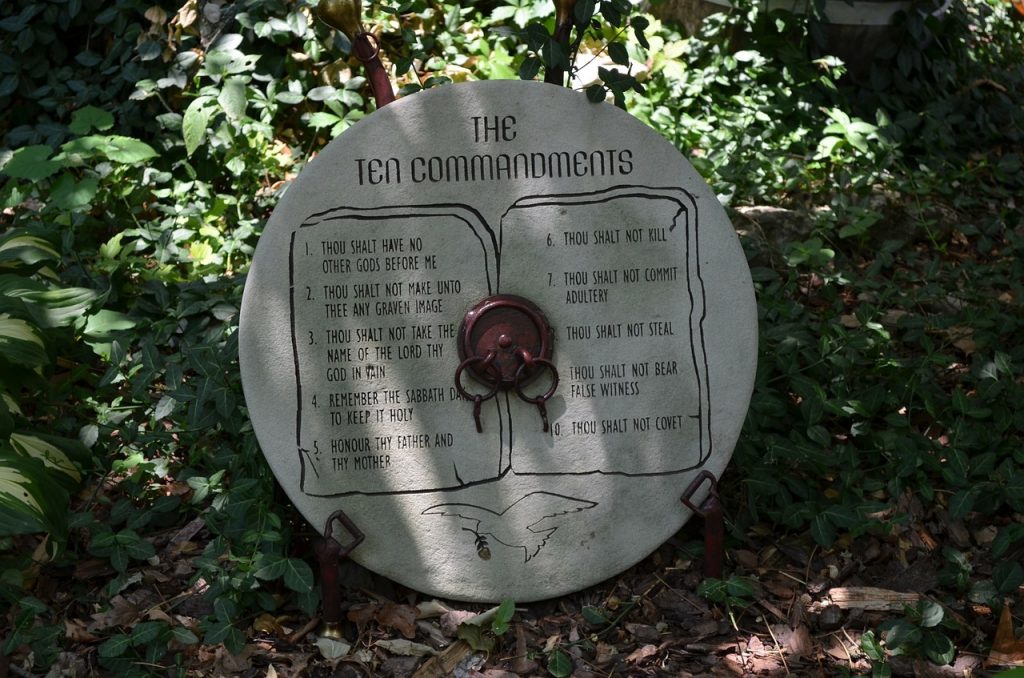Command is a word that makes us recoil or throw a tantrum.

After all, in the U.S. we are a free society with options in lifestyle and job opportunities; furthermore, we take pride in our Constitution that allows free speech and freedom of religion.
However, I don’t think it is just a U.S. proclivity. It’s human nature to rebel. After all, Adam and Eve resisted rules from the very beginning.
We don’t like being told what to do; however, it’s part of our daily life. We are told: to pay taxes, when to put our garbage out, to be at work at a certain time, to complete an assignment, etc. Although we don’t like it, for the most part, we obey the commands of men. Conversely, the commands of God are often ignored – even defied.
So, this week we are examining the Ten Commandments and how they influence our behavior – or not.
The Ten Commandments
And God spake all these words, saying,
2 I am the Lord thy God, which have brought thee out of the land of Egypt, out of the house of bondage.
3 Thou shalt have no other gods before me.
4 Thou shalt not make unto thee any graven image or any likeness of anything that is in heaven above, or that is in the earth beneath, or that is in the water under the earth.
5 Thou shalt not bow down thyself to them, nor serve them: for I the Lord thy God am a jealous God, visiting the iniquity of the fathers upon the children unto the third and fourth generation of them that hate me;
6 And shewing mercy unto thousands of them that love me, and keep my commandments.
7 Thou shalt not take the name of the Lord thy God in vain; for the Lord will not hold him guiltless that taketh his name in vain.
8 Remember the sabbath day, to keep it holy.
9 Six days shalt thou labor, and do all thy work:
10 But the seventh day is the sabbath of the Lord thy God: in it thou shalt not do any work, thou, nor thy son, nor thy daughter, thy manservant, nor thy maidservant, nor thy cattle, nor thy stranger that is within thy gates:
11 For in six days the Lord made heaven and earth, the sea, and all that in them is, and rested the seventh day: wherefore the Lord blessed the sabbath day, and hallowed it.
12 Honor thy father and thy mother: that thy days may be long upon the land which the Lord thy God giveth thee.
13 Thou shalt not kill.
14 Thou shalt not commit adultery.
15 Thou shalt not steal.
16 Thou shalt not bear false witness against thy neighbor.
17 Thou shalt not covet thy neighbor’s house, thou shalt not covet thy neighbor’s wife, nor his manservant, nor his maidservant, nor his ox, nor his ass, nor anything that is thy neighbor’ (Exodus 20: 1—17 KJV).
This week’s blog is unique. Instead of an article, it’s more of an exercise. You can complete this alone; however, including children, family, friends, or a Bible study group allows for conversation and more insight as you study each commandment.

You may want to complete all Ten Commandments in one sitting, five per day over a two-day period, or one commandment a day for ten days. Make it your own to fit your needs and schedule.
Before beginning this exercise:
- Designate a place as an altar or put a cross on a wall. You will see why later.
- Each person should have ten rocks or ten cans of food.
- Have a sturdy bag or small box for each person participating, or one box (large enough for all the cans or rocks) for everyone to use.
- Every participant needs paper to write notes – or designate a notetaker who logs the group input. You could use a flip chart.
After set up is complete, read Deuteronomy chapters 5 and 6. This helps with context, how the Ten Commandments were delivered, and the importance of these laws in the Israelite community.
Read each commandment and short commentary listed below. Although the written comments provide an overview, the suggested Scriptures provide more information, thus reading them provides perspective and a better understanding of each command. Remember the Bereans (Acts 17: 10-12) and read God’s Word for yourself.
Although there are some Old Testament Scriptures to help expand on the meaning, I’m primarily focusing on what the New Testament says about the Ten Commandments.
After studying each commandment, answer the following questions:

1) How can I summarize the NT explanation of this commandment? Write this sentence in your notebook or on the flip chart.
2) What emotion, action, or thought causes humans to defy this command? Add this to your notes.
3) Based on what I’ve learned about this commandment, have I committed this sin? If the answer is yes, place one rock or can into the bag or box. There is an explanation of what to do with the bag or box at the end of the study.
Command # 1. You shall have no other gods before Me.
Jesus spoke to the first commandment when he rebuked Satan (Matthew 4:10) refusing to worship him.
Of course, we are adamant that we never worship Satan. But how about when he whispers in our ear that the little white lie is ok because it doesn’t hurt anyone and keeps us out of trouble? Or it is ok to cut corners and save money on a project – no one will know. Every time we allow Satan to convince us to do wrong, we give him power. A power that only God should have in our lives.
In Psalm 83, Asaph begged the Almighty to show the evil world that the God of Abraham, Isaac, and Jacob is the one and only true God. Just like today, many didn’t acknowledge the true God. Regardless of where we stand, there will be a day when everyone bows and acknowledges Jesus as Savior. (Philippians 2: 9-11)
After reading the Scriptures below we should ask ourselves if rejecting or ignoring Jesus is the same as have other gods?
Read Psalm 83, Matthew 4:8-10, Mark 12: 7-11, and John 5: 43-44 and answer the three questions listed above.
Command # 2. You shall not make idols
Meditate on Ephesians 5:5, where Paul declares that putting worldly pursuits first in our lives makes us idolaters.
Although Jesus’ talk with the woman at the well isn’t directly about idol worship, He explained to her that God is Spirit and we can worship Him anywhere. This is unlike the man-made idols of men, which are confined to one place or a specific time.
Of course, we scoff at the lack of sophistication. We don’t build golden calves or statues to worship. Instead, we build careers, houses, reputations, and lifestyles. But our idols are just as limited. Careers end, houses deteriorate, reputations are ruined, and our lifestyles change as the seasons of life change.
Ask God to reveal the idols in our lives.
Read Psalm 135: 13-21, John 4:19-26, and Ephesians 5:5 and answer the three questions listed above.
Command # 3. Don’t take the name of God in vain.
This is a sin that we don’t take too seriously. How easy it is to use God’s name jokingly or in anger.
In Psalm 139, David declares that people who misuse God’s name are enemies of God.
Jesus tells us that using God’s name to make a vow puts us in dangerous territory.
Furthermore, the first line of the Lord’s Prayer says God’s name is holy.
So the next time we utter the name of Jesus Christ, say it reverently – not because a car pulled out in front of us.
Do we speak God’s name irreverently?
Read Psalm 139: 20-21, Matthew 5: 33-37, Matthew 6:9 and answer the three questions listed above.
Command # 4. Keep the Sabbath day holy.
Scripture tells us that Jesus was at the synagogue often. Jesus told us that he was here to uphold the law and He obeyed the fourth commandment. So why did the Pharisees accuse Jesus of allowing the disciples to break this law?
It was the Sabbath and the disciples were hungry, so they broke off the heads of grain and ate them. The Pharisees were gleeful. Harvesting a crop was work, and technically this is what the disciples were doing; however, Jesus reminded the Pharisees that David and his men ate the sacred bread when they were hungry. (1 Samuel 21: 1-6) God did not punish David and his men and Jesus was certainly not reprimanding his disciples.
Instead, Jesus admonished the Pharisees for distorting God’s laws with man-made rules and traditions and to use common sense and compassion when enforcing the law.
Do we distort God’s truths to fit in our boxes?
Read Matthew 12: 1-14, Mark 2:27-28, Luke 4:16, Luke 23:56, John 7: 21-24, and Acts 18:4 and answer the three questions listed above.
Command # 5. Honor your parents.
Paul reminds us that this is the first commandment that comes with a promise. He states it like this: if you obey your parents “things will go well with you.” How true. Our parents not only have lived longer and gained wisdom but have our best interest at heart. Why not honor them by respectfully and sincerely considering their advice?
Jesus addressed this command in a forceful way. He condemned the Jewish leaders for promising money to the church in order to avoid helping their parents. After carefully studying the Scriptures, ask ourselves if we truly honor our parents.
Read Matthew 15: 3-9, Mark 7: 9-13, Ephesians 6: 1- 3, 1 Timothy 5:8 and answer the three questions listed above.
Command # 6. Don’t murder.
Generally speaking, most of us think we have this one down pat, but not so fast; Jesus equates murder with anger, calling people fools or idiots, and cursing others. Read Genesis 4. What caused Adam and Eve’s son, Cain, to kill his brother Abel? It was jealousy and anger unleashed.
Of course, we all have heard “if you live by the sword you will die by the sword.” Did you know Jesus said this to Peter?
After studying the Scriptures listed below, we must contemplate our own anger issues. How many times have we called someone an idiot? Are we sure we obey the spirit of this command?
Read Genesis 4: 1-16, Matthew 5: 21-24 and Matthew 26:50-52, John 18: 10-11 and answer the three questions listed above.
Command # 7. Don’t commit adultery.
Another tough one, Jesus tells us we commit adultery when we lust. The message to gouge out an eye or take off a limb is not meant literally, but we must remove from our lives tempting circumstances, books, and entertainment in order to obey this command.
Consider what we can remove from our lives to keep this command.
Read Matthew 5: 27-28 and answer the three questions listed above.
Command # 8. Don’t steal.
For the most part, people understand the sin of stealing; however, it is interesting to note that Jesus says that individuals who deceive people about the only one true way to heaven are thieves. They kill and destroy lives because salvation is impossible without Jesus.
Are we witnessing to others about the only way to spend eternity with God?
Read John 10:1-10, and 1 Corinthians 6: 9-11 and answer the three questions listed above.
Command # 9. Don’t bear false witness.
Don’t think lying is a serious offense? The Bible tells us that bearing false testimony brings shame on the Name of God, and don’t forget that false witnesses were used to convict Jesus unjustly. Read the story of Ananias and Sapphira, found in Acts 5: 1-10, for an eye-opener about lying.
Of course, there are examples of lying in the Bible, that not only go unpunished, but are rewarded. The midwives lied to Pharaoh when they disobeyed his orders to kill the Hebrew baby boys (Exodus 1: 15-21) and Rahab lied to authorities in order to save the Israelite spies from capture and certain death. (Joshua 2: 1-14)
Scholars with far greater minds than mine grapple with this dichotomy, but I think we need only to look to Jesus when he admonished the Pharisees regarding the Sabbath to use common sense and compassion when enforcing the law. (Matthew 12: 9-14)
Read Leviticus 19:12, Mark 14:56, and Acts 5:1-10 and answer the three questions listed above.
Command # 10. Don’t covet what others have.
Being satisfied with what we have (Hebrews 13:5) runs counter to our American privilege. James outlines how envy leads to so many problems in our lives and even in our churches. Material possessions are what most people think when we hear the word covet, but there are many other aspects at play including power, fame, appearance, education, position, lifestyle, and yes even health.
Read Matthew 6:25, Mark 7: 22-23, Hebrews 13:5, James 4: 1-7 and answer the three questions listed above.
Did you answer all the questions for each commandment and, if applicable, place your rock or can in the container?
Take your bag or box and lay it at the altar or foot of the cross. Ask forgiveness and read Titus 3: 5-7.
Feel the Freedom

I know this is a little different than a regular post, but I hope you found it enlightening. If your children worked on this exercise with you, and you want more information about God’s laws, check out my child’s devotion that covers Exodus, Leviticus, Numbers, and Deuteronomy. https://www.womenseekingchrist.com/7-bible-overview/
Also, the late R.C. Sproul wrote an article about how Christians react to God’s Laws. You might want to take a look. https://www.ligonier.org/learn/articles/the-law-of-god/
THOUGHT OR ACTION STEP FOR THE WEEK:
Since this entire post was action oriented there is no action step this week; although if you know of someone who would enjoy this activity, please forward this post to them or share on FB and other social media.
Are you new to the site? Please subscribe by clicking on the heart to the right of this article. Provide your email and receive weekly notifications about WSC blog posts. Promise your inbox won’t be inundated and WSC never shares email information.
Blessings until next time.

